Farmers across the country are bracing for what will be another very tough week. Who could have foreseen a time when farmers would need special status simply to leave their farm and drive to their local co-op. Today, every farmer going more than two kilometres away from their residence will need to be able to prove that they are a farmer engaging in farming activity. Our news team have complied an identification identification check list.
We truly are living in unprecedented times and with this comes unprecedented challenges at farm level. The effective lockdown comes at an exceptionally busy time, especially on sheep farms where lambing is in full swing and on tillage farms where a sowing window has finally arrived. Our own beef and sheep demonstration farm in Tullamore was impacted with two students having to leave at the weekend after being recalled by their colleges. Our beef and suckler editor Adam Woods discusses the steps farm manager Shaun Diver has implemented to try and reduce the workload.
For dairy farmers it now looks likely that peak milk is going to coincide with peak cases of COVID-19
Meanwhile, for dairy farmers it now looks likely that peak milk is going to coincide with peak cases of COVID-19. Some processors are already reporting staff pressures as cases of COVID-19 are confirmed in their workforce. While the number of confirmed cases has been small, the impact comes in the form of contacts that have to go into isolation for two weeks. Priority testing for these workers would ease the challenges but we have to accept that there are many frontline health workers more deserving.
Dairy processors
Rumours were rife in the sector last week that after a meeting of dairy processors, a move to once a day milking was going to be proposed as a means of building flex into the system should processing capacity be restricted in the weeks ahead. So that there would be no doubt as to the impact that such a move would have at farm level, our dairy specialist Aidan Brennan laid bare the figures. As he reports, the hit to profitability for the average dairy farmer by going once a day milking would be €17,000. Clearly this is not a legitimate ask of farmers by processors for something that might happen.
To get further clarity, our deputy editor Jack Kennedy contacted the chairmen of various dairy processors. Their views can be found here . The starkness of the figures had clearly focused minds. As our news team reported at the weekend IFA president Tim Cullinan has rejected the proposal outright.
Of course in such uncertain times the threat to processing capacity is real and farmers should look at what steps they can take to reduce the milk produced on the margins - should meal feeding levels be continued at current levels?
Market disruption
Along with maintaining processing capacity there is also the challenge of market disruption and potential for increased demands on working capital. Speaking to informed sources at the weekend, holding an extra ten thousand tonnes of powder in stock requires co-ops to access an additional €30 million in working capital. Reports to date are that banks are engaging positively when it comes to putting in place additional funds.
Given the market challenges facing all sectors it is disappointing that the meeting of EU agricultural ministers last Wednesday failed to recognise the need for an urgent response. As our news team report the meeting appears to have been more of a talking shop with no solid actions delivered.
Private Storage Aid
In the case of the dairy sector, Private Storage Aid (PSA) has been called for. You can read the request from Dairy Industry Ireland here . It is a logical demand that would help fund processors to store product until markets stabilise.
However in my editorial in last week’s Irish Farmers Journal, I argue against looking at storage schemes for beef. You can read my reasons why but ultimately it comes down to the fact that you have to freeze beef to put it into storage, therefore devaluing it further. We should be more innovative as unlike in dairy, where cows need to be milked daily, we can hold cattle back from slaughter and go back to grass. While far from ideal for many farmers, it will be a better option than marketing them at a bad price. To give farmers confidence to make this decision we would urge the European Commission to introduce a scheme where beef markets would be supported in the second half of the year if necessary - a deficiency model where a top up would be provided if markets were below the agreed threshold. Decisive action now by the EU will allow markets respond quickly after COVID-19 has been brought under control - failure to act could see a long and costly delay in markets bouncing back.
It is important that farmers make themselves familiar with and adhere to the protocols that service providers are now implementing.
Looking ahead to this week and the focus will be on learning to operate within the new restrictions imposed at the weekend. While there are still grey areas the most up to date information can be found by clicking here. At this stage it appears that most services will still be available to farmers but the way in which we engage with them will change. It is important that farmers make themselves familiar with and adhere to the protocols that service providers are now implementing. We will keep you up to date as these evolve at www.farmersjournal.ie.
Meanwhile our technical specialists will continue to provide you with advice on how you can maintain farm productivity at this important time in the farming calendar. To help with this we have introduced a new free digital platform called Farm Tech Talks which you can view here. With the support of FBD, MSD, Ornua and Bord Bia, we will bring you two weekly broadcasts covering technical issues plus latest news updates. Also conscious that the closure of livestock marts comes at a time when over 500,000 cattle are normally traded, we will have a cattle price calculator coming on stream early this week. The tool will allow you calculate the value of your animal, based on sales data collected on hundreds of thousands of animals recorded through our Martbids app.
Finally could I wish all farmers the every success through what will be a challenging week. I can assure that we will continue to challenge ourselves in the Irish Farmers Journal in how we can do more to support you in these difficult times. Please feel free to contact me (jmccarthy@farmersjournal.ie) with any suggestions.
Keep farming and keep safe and remember as highlighted on our most recent front page
We can do this.






 This is a subscriber-only article
This is a subscriber-only article










SHARING OPTIONS: